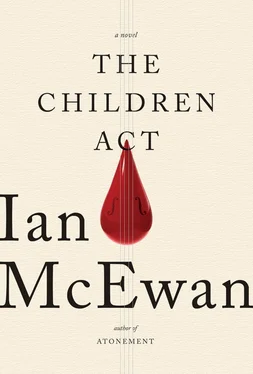She entered, the court rose, she sat and watched the parties below her settle. At her elbow was a slim pile of creamy white paper beside which she laid down her pen. It was only then, at the sight of these clean sheets, that the last traces, the stain, of her own situation vanished completely. She no longer had a private life, she was ready to be absorbed.
Ranged before her were the three parties. For the hospital, her friend Mark Berner QC and two instructing solicitors. For Adam Henry and his guardian, the Cafcass officer, was an elderly barrister, John Tovey, not known to Fiona, and his instructing solicitor. For the parents, another silk, Leslie Grieve QC, and two solicitors. Sitting by them were Mr. and Mrs. Henry. He was a wiry, tanned man in a well-cut suit and tie in which he himself could have passed for a successful member of the judiciary. Mrs. Henry was big-boned and wore outsized glasses with red frames that shrank her eyes to points. She sat upright, with tightly folded arms. Neither parent looked particularly cowed. Outside in the corridors, Fiona assumed, journalists would soon be assembling to wait until she allowed them in to hear her decision.
She began. “You’re all aware that we are here on a matter of extreme urgency. Time is of the essence. Everyone please bear this in mind and speak briefly and to the point. Mr. Berner.”
She inclined her head toward him and he stood. He was smoothly bald, bulky, but with dainty feet—size five, it was rumored—for which he was mocked behind his back. His voice was a decent rich tenor and together their greatest moment had been last year when they performed Schubert’s “Der Erlkönig” at a Gray’s Inn dinner for a retiring law lord with a passion for Goethe.
“I shall indeed be brief, My Lady, for, as you indicate, the situation is pressing. The applicant in the matter is the Edith Cavell General, Wandsworth, which is seeking the leave of this court to treat a boy, named A in the papers, who will be eighteen in less than three months. He experienced sharp stomach pains on the fourteenth of May when he was putting on his pads to open the batting for his school cricket team. During the following two days these pains became severe, unbearable even. The GP, despite great expertise and experience, was at a loss and referred—”
“I’ve read the papers, Mr. Berner.”
The barrister moved on. “Then, My Lady, I believe it is accepted by all parties that Adam is suffering from leukemia. The hospital wishes to treat him in the usual manner with four drugs, a therapeutic procedure universally recognized and practiced by hematologists, as I can show—”
“No need, Mr. Berner.”
“Thank you, My Lady.”
Berner advanced quickly to outline the conventional course of treatment and this time Fiona did not intervene. Two of the four drugs targeted the leukemia cells directly, whereas the other two poisoned much in their path, in particular the bone marrow, thereby compromising the body’s immune system and its ability to make red and white blood cells and platelets. Consequently, it was usual to transfuse during treatment. In this case, however, the hospital was prevented from doing so. Adam and his parents were Jehovah’s Witnesses and it was contrary to their faith to accept blood products into their bodies. This apart, the boy and his parents agreed to any treatment the hospital could offer.
“And what has been offered?”
“My Lady, in deference to the family’s wishes, only the leukemia-specific drugs have been administered. They are not considered sufficient. It’s at this point I’d like to call the consultant hematologist.”
“Very well.”
Mr. Rodney Carter took the stand and was sworn in. Tall, stooping, severe, thick white eyebrows from under which he glared with ferocious disdain. From the top pocket of his pale gray three-piece suit there protruded a blue silk handkerchief. He gave the impression that he considered the court procedure a nonsense and that the boy should be dragged by the scruff of his neck to an immediate transfusion.
There followed standard questions to establish Carter’s bona fides, his length of experience and seniority. When Fiona cleared her throat softly, Berner took the hint and pressed on. He asked the doctor to summarize for the benefit of the judge the patient’s condition.
“Not at all good.”
He was asked to elaborate.
Carter drew breath and looked about him, saw the parents and looked away. His patient was weak, he said, and, as expected, showing the first signs of breathlessness. If he, Carter, had had a free hand in treatment, he would have expected an eighty to ninety percent chance of a full remission. With the current course, the chances were much reduced.
Berner asked for specific data concerning Adam’s blood.
When the boy was admitted, Carter said, the hemoglobin count was 8.3 grams per deciliter. The norm being around 12.5. It had declined steadily. Three days ago it had been 6.4. This morning it was at 4.5. If it dropped further to 3, the situation would be extremely dangerous.
Mark Berner was about to ask another question but Carter spoke over him.
“The white cell count is usually somewhere between 5 and 9. It’s now 1.7. As for the platelets—”
Fiona interrupted. “Would you kindly remind me of their function?”
“Necessary for clotting, My Lady.”
The norm, the consultant told the court, was 250. The boy’s count was 34. Below 20 one would expect spontaneous bleeding to occur. At this point, Mr. Carter turned his head a little away from the barrister so that he seemed to address the parents. “The latest analysis,” he said gravely, “shows us that no new blood is being produced. A healthy adolescent might be expected to produce five hundred billion blood cells a day.”
“And if, Mr. Carter, you could transfuse?”
“The boy would stand a decent chance. Though not as good as it would have been if we’d transfused from the start.”
Berner paused briefly, and when he spoke again, he lowered his voice, as though to dramatize the possibility of Adam Henry overhearing him. “Have you discussed with your patient what will happen to him if he is not transfused?”
“Only in the broadest terms. He knows he could die.”
“He has no idea of the manner of his death. Would you care to give the court an outline?”
“If you want.”
Berner and Carter appeared to be colluding in the grisly facts for the benefit of the parents. It was a reasonable line of approach and Fiona did not intervene.
Carter said slowly, “It will be distressing, not only for himself but for the medical team treating him. Some of the staff are angry. They routinely hang blood, as the Americans put it, all day long. They simply can’t understand why they should risk losing this patient. One feature of his decline will be his fight to breathe, a fight he will find frightening and is bound to lose. The sensation will be one of drowning slowly. Before that he may suffer internal bleeding. Renal failure is a possibility. Some patients lose their sight. Or he may suffer a stroke, with any number of neurological consequences. Cases differ. The only sure thing is that it would be a horrible death.”
“Thank you, Mr. Carter.”
Leslie Grieve for the parents rose to cross-examine. Fiona knew Grieve a little by reputation, but at that moment couldn’t recall whether he had ever appeared before her. She had seen him about the law courts—somewhat foppish, with silver, center-parted hair, high cheekbones, long thin nose, haughtily flared. There was a looseness or freedom of limb that was in agreeable contrast to the reined-in movements of his graver colleagues. The entire grand and gay effect was complicated by a problem he had with his vision, a squint of some sort, for he never appeared to be looking at what he was seeing. This disability added to his allure. It sometimes disoriented witnesses in cross-examination and it may have caused the doctor’s tetchiness now.
Читать дальше












